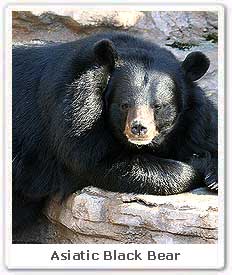| Kingdom : | Animalia |
| Phylum : | Chordata |
| Class: | Mammalia |
| Order : | Carnivora |
| Family : | Ursidae |
| Genus : | Ursus |
| Species : | U. thibetanus |
| Zoological name : | Ursus Thibetanus |
| Found In | Ranthambore, Namdapha and Kaziranga National Parks in India |
 Physical
appearance : Asiatic Black Bear have the jet black fur with the brown
muzzle and a whitish chin. They have thick hair around the neck and
shoulders. Asiatic Black Bear are usually the medium size bear and their
length exceeds from four to six feet. Males weigh around 220 to 480 pounds
and females around 110 to 275 pounds. They have large rounded ears that are
set apart on their large round head. Their claws are short and strong that
are used for climbing and peeling bark to eat. Unlike the humans, black bear
walks with their entire foot. They can also stand up in their legs for
longer period of time. They have large eyes and the very short stubby
tail.They have highly developed senses. Asiatic Black Bear is brown or black
in colour.
Physical
appearance : Asiatic Black Bear have the jet black fur with the brown
muzzle and a whitish chin. They have thick hair around the neck and
shoulders. Asiatic Black Bear are usually the medium size bear and their
length exceeds from four to six feet. Males weigh around 220 to 480 pounds
and females around 110 to 275 pounds. They have large rounded ears that are
set apart on their large round head. Their claws are short and strong that
are used for climbing and peeling bark to eat. Unlike the humans, black bear
walks with their entire foot. They can also stand up in their legs for
longer period of time. They have large eyes and the very short stubby
tail.They have highly developed senses. Asiatic Black Bear is brown or black
in colour. Presence in India : Asiatic Black Bear are mostly found in the Northern parts of India. They are also spotted in the Ranthambore, Namdapha and Kaziranga National Parks in India.
Species : There are four sub species of the Asiatic Black Bear namely U.t. japonicus (Japan), U.t. formosanus (Taiwan), U.t. ussuricus (Mongolia) and U.t. thibetanus for all other regions.
Habitat : Asiatic Black Bear live in forests, hilly or mountainous areas. They occur as high as 9,900 ft., they are also found in the lowlands.
Diet : Asiatic Black Bear is omnivorous eating insects, fruit, nuts, termites, beehives, goats, sheeps, carrion and birds.
Reproduction : Asiatic Back Bear usually mate during the spring or autumn season (May to July). They do not usually breed until three or four years old. In the north, breeding season begins in early summer; young are usually born in the mothers' winter dens. However, this schedule varies. In Pakistan, for instance, mating may take place in fall. Young stay with their mothers for two to three years, and females with first-year young do not usually breed the next season. Gestation period is unknown. Females give birth to two cubs, which weigh around 223 grams. Cubs stay with mothers for two years.
Conservation status : The Asiatic Black Bear is listed as vulnerable on the World Conservation Union's (IUCN's) Red List of Threatened Animals. Deforestation and loss of habitat has seriously declined their population. Asiatic Black Bear are also haunted for their gall- bladders, which are used to make medicines.
Lifespan : Longevity of the Asiatic Black Bears exceeds more than the 25 years. Their longevity in the wild is unknown.






